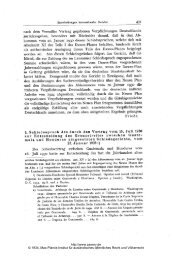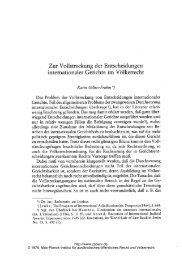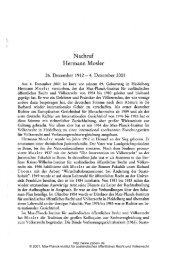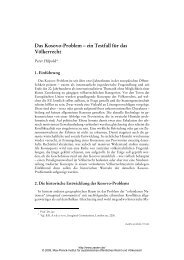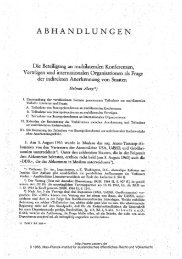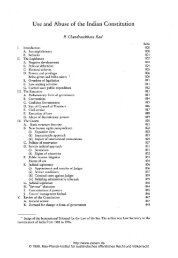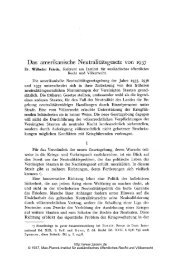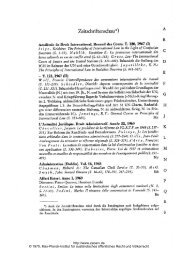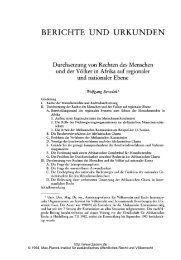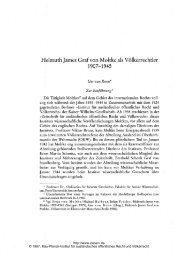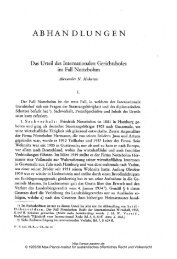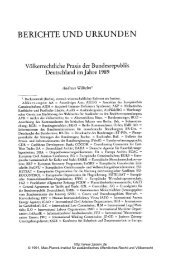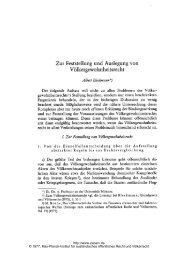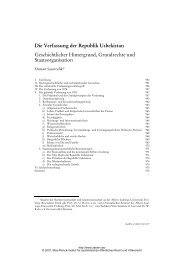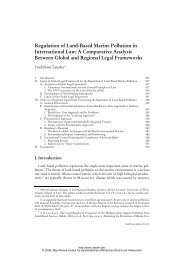"obligatorische" Gerichtsbarkeit des Internationalen Gerichtshofs
"obligatorische" Gerichtsbarkeit des Internationalen Gerichtshofs
"obligatorische" Gerichtsbarkeit des Internationalen Gerichtshofs
Sie wollen auch ein ePaper? Erhöhen Sie die Reichweite Ihrer Titel.
YUMPU macht aus Druck-PDFs automatisch weboptimierte ePaper, die Google liebt.
264 Oellers-Frahm<br />
tained in it in order to except disputes concerning Central America from the<br />
jurisdiction of the Court was rejected. The. problem here concerned the question<br />
whether there could exist pre-seisin reciprocity between the parties to a dispute not<br />
yet before the Court and whether time-limits underfall, at all-the reciprocity principle.<br />
Both questions have found a negative answer.<br />
4. Finally the United States had invoked the multilateral treaty reservation of its<br />
declaration in order to exclude jurisdiction under the optional clause. Since, how-<br />
ever, Nicaragua had based its claims not only on treaty<br />
law but also on identical<br />
customary law this reservation could not lead to denial of jurisdiction under Art.36<br />
para.2 of the Statute.<br />
5. As to the second basis of jurisdiction, accepted by the Court, namely the<br />
Treaty of Friendship, Navigation and Commerce.of 1956, the author argues<br />
against the findings of the Court holding-that the. actual object of the request<br />
cannot be treated under a commercial treaty; the author accepts, however, that the<br />
opposite opinion of the Court is not manifestly untenable.<br />
II. Having thus rejected nullity of the judgment<br />
as- -justifying the, United States'<br />
disregard of the decision, the author then treats the'problem of the consequences<br />
which must be drawn from the United States' behaviour *,as well as from the similar<br />
attitude of other States confronted by a judgment contrary to their wishes. These'<br />
facts indu6e the author to conclude that there are somequestions which States are<br />
not ready to submit to third party settlement because these questions<br />
involve the<br />
vital interests or honour of the State concerned.- Such questions,have traditionally<br />
been excluded from international jurisdiction by the <strong>"</strong>;interests- and h6nour-<br />
clause<strong>"</strong>;'. Practice shows that the ambition, of reaching full compulsory jurisdiction<br />
in international law is an illusion. Therefore, States should adapt their declaraxions<br />
under Art.36 para.2 to their actual willingness .to accept compulsory jurisdiction.<br />
Even the possibility of decline or abandonment of compulsory jurisdiction is<br />
preferrable to declarations not in conformity with States' real intentions resulting<br />
in disregard of the Court's decisions. Only this adaptation would really enhance<br />
the role of the IQJ.<br />
http://www.zaoerv.de<br />
© 1987, Max-Planck-Institut für ausländisches öffentliches Recht und Völkerrecht



